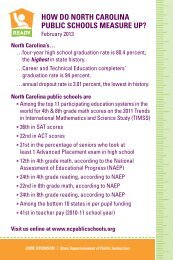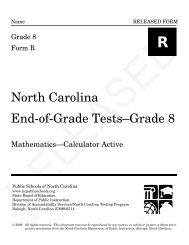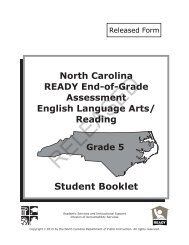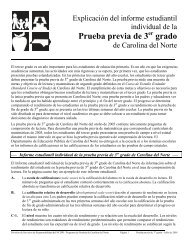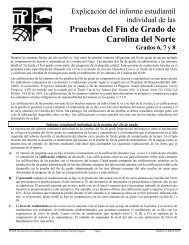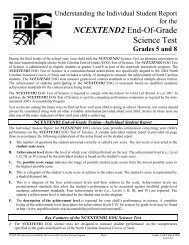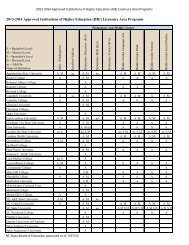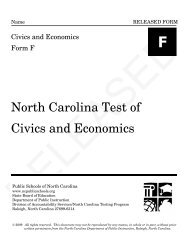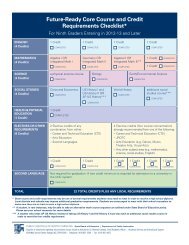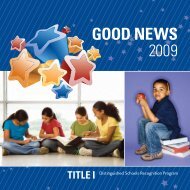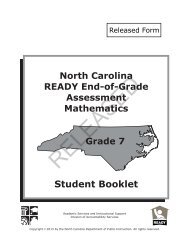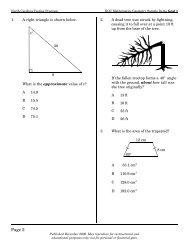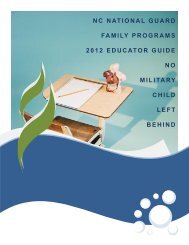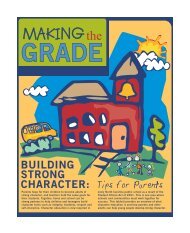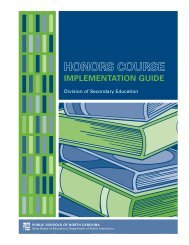ELA/Reading Grade 7 - Public Schools of North Carolina
ELA/Reading Grade 7 - Public Schools of North Carolina
ELA/Reading Grade 7 - Public Schools of North Carolina
Create successful ePaper yourself
Turn your PDF publications into a flip-book with our unique Google optimized e-Paper software.
Released Form<br />
<strong>North</strong> <strong>Carolina</strong><br />
READY End-<strong>of</strong>-<strong>Grade</strong><br />
Assessment<br />
English Language Arts/<br />
<strong>Reading</strong><br />
<strong>Grade</strong> 7<br />
RELEASED<br />
Student Booklet<br />
Academic Services and Instructional Support<br />
Division <strong>of</strong> Accountability Services<br />
Copyright 2013 by the <strong>North</strong> <strong>Carolina</strong> Department <strong>of</strong> <strong>Public</strong> Instruction. All rights reserved.
GRADE 7 E NGLISH L ANGUAGE A RTS/READING— R ELEASED F ORM<br />
Sample Questions<br />
Song (1914)<br />
by Rupert Brooke<br />
All suddenly the wind comes s<strong>of</strong>t,<br />
And Spring is here again;<br />
And the hawthorn quickens with buds <strong>of</strong> green,<br />
And my heart with buds <strong>of</strong> pain.<br />
5 My heart all Winter lay so numb<br />
The earth is dead and frore, *<br />
That I never thought the Spring would come,<br />
Or my heart wake any more.<br />
But Winter’s broken and earth has woken,<br />
10 And the small birds cry again;<br />
And the hawthorn hedge puts forth its buds,<br />
And my heart puts forth its pain.<br />
* frore: frozen<br />
RELEASED<br />
1 Go to the next page.
GRADE 7 E NGLISH L ANGUAGE A RTS/READING— R ELEASED F ORM<br />
S1 What can be inferred from line 5?<br />
A<br />
B<br />
C<br />
D<br />
The speaker’s heart is asleep.<br />
The speaker’s heart is afraid.<br />
The speaker’s heart is paralyzed.<br />
The speaker’s heart is extremely cold.<br />
S2<br />
In the second stanza, how does the poet’s choice <strong>of</strong> words impact the meaning <strong>of</strong><br />
the poem?<br />
A<br />
B<br />
C<br />
D<br />
It gives the differences between Winter and Spring.<br />
It describes how cold it gets during Winter.<br />
It explains how the speaker views the different seasons.<br />
It emphasizes the despair the speaker feels about the loss <strong>of</strong> Spring.<br />
RELEASED<br />
2
GRADE 7 E NGLISH L ANGUAGE A RTS/READING— R ELEASED F ORM<br />
Ski Tracks on Silver Bell<br />
by Jean Heyn<br />
1 Which quote from the selection supports the theme?<br />
A<br />
B<br />
C<br />
“Winning the race would make him the Junior Champ <strong>of</strong> the Steamboat<br />
Springs Ski Club.”<br />
“His skis bit the snow as he zigzagged through the gates—ten, fifteen,<br />
twenty.”<br />
“Though his knee hurt, he thought only <strong>of</strong> winning the race.”<br />
D “ ‘You’re a fine skier, and you have a compassionate heart.’ ”<br />
2 How are the characters in this selection affected by the setting?<br />
A<br />
B<br />
C<br />
D<br />
Chip becomes a stronger person because he helps a man in need during a<br />
snowstorm.<br />
Roger becomes scared and skis away by himself, leaving Chip alone in the<br />
woods.<br />
Big Matt is disappointed that Chip almost left a man alone in the woods to<br />
compete in a race.<br />
RELEASED<br />
Chip crashes during the snowstorm and gives up his dream <strong>of</strong> skiing in the<br />
Olympics.<br />
3 How does the conversation in paragraphs 2 and 3 impact the story’s plot?<br />
A<br />
B<br />
C<br />
D<br />
It foreshadows how Roger will easily win the race with no problems.<br />
It predicts that a conflict will prevent Chip from winning.<br />
It shows that Roger is jealous <strong>of</strong> Chip and will start a conflict.<br />
It demonstrates how arrogance can negatively affect anyone.<br />
3<br />
Go to the next page.
GRADE 7 E NGLISH L ANGUAGE A RTS/READING— R ELEASED F ORM<br />
Ski Tracks on Silver Bell<br />
by Jean Heyn<br />
4 What is the effect <strong>of</strong> the author’s use <strong>of</strong> foreshadowing in paragraph 4?<br />
A It hints that danger is approaching.<br />
B It hints that happiness is in the air.<br />
C It hints that a win is sure to happen.<br />
D It hints that peacefulness will continue.<br />
5 In paragraph 4, what does the figurative language below describe?<br />
“On either side <strong>of</strong> the trail stood spruce laden with quilts <strong>of</strong> sparkling white.”<br />
A coverings used to stay warm in cold weather<br />
B a white light shining through the trees in the forest<br />
C a thick blanket <strong>of</strong> snow covering the trees<br />
D a snowfall that has weighed down the grass<br />
RELEASED<br />
6 In paragraph 20, what is the effect <strong>of</strong> comparing the skiers to springs?<br />
A It shows that the skiers were eager and ready to ski.<br />
B<br />
C<br />
D<br />
It shows that the skiers were wound around their skis.<br />
It shows that the skiers were bouncing up and down.<br />
It shows that the other skiers were angry that they had to wait.<br />
4<br />
Go to the next page.
GRADE 7 E NGLISH L ANGUAGE A RTS/READING— R ELEASED F ORM<br />
Ski Tracks on Silver Bell<br />
by Jean Heyn<br />
7 Which quote from the selection shows the reason Chip nearly missed the race?<br />
A “Before they reached Elk Meadows, Chip turned <strong>of</strong>f onto Silver Bell, a<br />
little-known<br />
RELEASED<br />
shortcut.”<br />
B “Halfway down, he saw the tracks—odd tracks that ran <strong>of</strong>f the edge <strong>of</strong> the<br />
trail into the woods.”<br />
C “Suddenly, his injured knee buckled beneath him. He fell, tumbling over and<br />
over.”<br />
D “He was taken to the clinic to have his knee strapped, then home to rest.”<br />
8 Based on the selection, what can be inferred about slalom skiing?<br />
A It is a form <strong>of</strong> racing on one ski that involves exploring little-known trails.<br />
B It is a form <strong>of</strong> straight downhill racing on skis where the fastest time wins.<br />
C It is a form <strong>of</strong> skiing that requires agility and speed in stopping to open and<br />
close gates.<br />
D It is a form <strong>of</strong> racing on skis that involves rapid turns around carefully placed<br />
obstacles.<br />
5<br />
Go to the next page.
GRADE 7 E NGLISH L ANGUAGE A RTS/READING— R ELEASED F ORM<br />
On This Day: Krazy George Henderson Leads First<br />
Crowd Wave<br />
by findingDulcinea Staff<br />
9 How does the first sentence affect the reader’s understanding <strong>of</strong> the rest <strong>of</strong> the<br />
selection?<br />
A<br />
B<br />
C<br />
D<br />
by beginning with the outright statement that George Henderson performed<br />
the wave first<br />
by capturing the reader’s attention with a startling statistic<br />
by giving the reader a detailed history <strong>of</strong> the wave<br />
by specifying the scientific reasoning for the wave’s origin<br />
10 Why is “human wave” enclosed in quotation marks in paragraph 2?<br />
A<br />
B<br />
C<br />
D<br />
It is a direct quotation spoken by a character.<br />
It is the meaning <strong>of</strong> a specific nautical term.<br />
It is the name <strong>of</strong> a group <strong>of</strong> surfers well-known for their skills.<br />
RELEASED<br />
It is the name for a specific fan activity at athletic events.<br />
11 In the context <strong>of</strong> paragraph 5, what is the meaning <strong>of</strong> unveiled?<br />
A<br />
B<br />
C<br />
D<br />
wore a sweater<br />
removed a head covering<br />
not clearly seen<br />
revealed for the first time<br />
6<br />
Go to the next page.
GRADE 7 E NGLISH L ANGUAGE A RTS/READING— R ELEASED F ORM<br />
On This Day: Krazy George Henderson Leads First<br />
Crowd Wave<br />
by findingDulcinea Staff<br />
12 Based on the context <strong>of</strong> paragraph 11, what is antagonism?<br />
A<br />
B<br />
C<br />
D<br />
active hostility<br />
energetic action<br />
friendly gesture<br />
open cooperation<br />
13 According to the selection, why is there controversy over the creation <strong>of</strong> the wave?<br />
A ESPN’s Jim Caple claims to have created the wave in the 1970s.<br />
B<br />
C<br />
D<br />
Rob Weller and George Henderson both claim to have invented the wave in<br />
October <strong>of</strong> 1981.<br />
The Oakland A’s lost their game, and the wave did not catch on.<br />
The Husky fans continued to participate in the wave throughout the season.<br />
RELEASED<br />
14 Why did the author include the subheading “The Science <strong>of</strong> the Wave”?<br />
A<br />
B<br />
C<br />
D<br />
to show that the wave is a unique event that merits scientific study<br />
to show that scientists have studied the wave and understand how it works<br />
to show that the wave gained popularity at the 1986 World Cup<br />
to show that the wave can be started by as few as 35 people<br />
7<br />
Go to the next page.
GRADE 7 E NGLISH L ANGUAGE A RTS/READING— R ELEASED F ORM<br />
On This Day: Krazy George Henderson Leads First<br />
Crowd Wave<br />
by findingDulcinea Staff<br />
15 What is the summary <strong>of</strong> the section “The Science <strong>of</strong> the Wave”?<br />
A<br />
B<br />
C<br />
D<br />
The human wave is a fad that is no longer popular in Mexico.<br />
There is a systematic way in which a human wave is produced.<br />
At any given sporting event, a human wave will be different.<br />
There are no consistent features in a human wave.<br />
16 Which statement gives support to the assertion that George Henderson created<br />
the wave?<br />
A “The wave became widespread in the 80s and early 90s . . .”<br />
B “Rob Weller claims he led the world’s first wave on October 31, 1981, . . .”<br />
C<br />
D<br />
“ ‘The A’s season ended on October 15, 1981, and there I am on this video<br />
leading the wave.’ ”<br />
RELEASED<br />
“ ‘The Wave was a very intimidating thing for awhile until everyone copied<br />
us.’ ”<br />
8<br />
Go to the next page.
GRADE 7 E NGLISH L ANGUAGE A RTS/READING— R ELEASED F ORM<br />
Adapted from “Story-Time”<br />
by Edgar A. Guest<br />
“Tell us a story,” comes the cry<br />
From little lips when nights are cold,<br />
And in the grate the flames leap high.<br />
“Tell us a tale <strong>of</strong> pirates bold,<br />
5 Or fairies hiding in the glen,<br />
Or <strong>of</strong> a ship that’s wrecked at sea.”<br />
I fill my cup, and there and then<br />
Gather the children round my knee.<br />
I give them all a role to play—<br />
10 No longer are they youngsters small,<br />
And I, their daddy, turning gray;<br />
We are adventurers, one and all.<br />
We journey forth as Robin Hood<br />
In search <strong>of</strong> treasure, or to do<br />
15 Some deed <strong>of</strong> daring or <strong>of</strong> good;<br />
Our hearts are ever brave and true.<br />
We take a solemn oath to be<br />
Defenders <strong>of</strong> the starry flag;<br />
We brave the winter’s stormy sea,<br />
20 Or climb the rugged mountain crag,<br />
To battle to the death with those<br />
Who would defame our native land;<br />
We pitch our camp among the snows<br />
Or on the tropics’ burning sand.<br />
RELEASED<br />
25 We rescue maidens, young and fair,<br />
Held captive long in prison towers;<br />
We slay the villain in his lair,<br />
For we’re possessed <strong>of</strong> special powers.<br />
And though we desperately fight,<br />
30 When by our foes are we beset,<br />
We always triumph for the right;<br />
We have not lost a battle yet.<br />
9<br />
Go to the next page.
GRADE 7 E NGLISH L ANGUAGE A RTS/READING— R ELEASED F ORM<br />
It matters not how far we stray,<br />
Nor where our battle lines may be,<br />
35 We never get so far away<br />
That we must spend a night at sea.<br />
It matters not how high we climb,<br />
How many foes our pathway block,<br />
We always conquer just in time<br />
40 To go to bed at 9 o’clock.<br />
17 How does the use <strong>of</strong> descriptive language affect the reader?<br />
A<br />
B<br />
C<br />
D<br />
The reader wants to find out more about the adventures.<br />
The reader will tell stories <strong>of</strong> adventures.<br />
The reader will want to go on an adventure.<br />
The reader can visualize the adventures.<br />
18 In line 3, what does the phrase “the flames leap high” tell the reader?<br />
A<br />
B<br />
C<br />
D<br />
There is a fire in the fireplace.<br />
There is a building on fire outside.<br />
The children are building a fire.<br />
RELEASED<br />
Firemen are putting out a fire.<br />
10<br />
Go to the next page.
GRADE 7 E NGLISH L ANGUAGE A RTS/READING— R ELEASED F ORM<br />
19 Based on the context <strong>of</strong> lines 21–22, what is the meaning <strong>of</strong> defame?<br />
A<br />
B<br />
C<br />
D<br />
disgrace or damage<br />
make famous and noteworthy<br />
make sad and gloomy<br />
irritate or bother<br />
20 In line 30, what is the meaning <strong>of</strong> the word beset?<br />
A frightened<br />
B defeated<br />
C attacked<br />
D angered<br />
21 In line 39, how does the phrase “We always conquer just in time” affect the poem?<br />
A It creates a sense <strong>of</strong> suspense for the reader.<br />
B It explains how their foes were beaten in battle.<br />
C<br />
D<br />
It shows the reader how gallantly they have fought.<br />
RELEASED<br />
It creates a sense <strong>of</strong> amusement in the flow <strong>of</strong> the story.<br />
11<br />
Go to the next page.
GRADE 7 E NGLISH L ANGUAGE A RTS/READING— R ELEASED F ORM<br />
22 In the poem, how does the speaker know it is time to end his story?<br />
A<br />
B<br />
C<br />
D<br />
The villain has been slain.<br />
The maiden has been rescued.<br />
The children have to go to bed.<br />
The family has traveled too far away.<br />
RELEASED<br />
12<br />
Go to the next page.
GRADE 7 E NGLISH L ANGUAGE A RTS/READING— R ELEASED F ORM<br />
From Marbles to Machines<br />
by Kerrily Sapet<br />
23 Which quotation summarizes the central idea <strong>of</strong> this selection?<br />
A<br />
B<br />
C<br />
D<br />
“Early voters used simple, inexpensive objects to cast their votes.”<br />
“Many different styles <strong>of</strong> voting machines have been invented to make<br />
counting more accurate.”<br />
“Many communities around the world provide transportation to the polls.”<br />
“Whether a voter drops a marble into a drum or points and clicks on the<br />
Internet, voting is an important process all around the world.”<br />
24 What is the reason the selection is named “From Marbles to Machines”?<br />
A<br />
B<br />
C<br />
D<br />
to show how voting is done in America<br />
to show how voting has changed over the years<br />
to show how people vote in Australia and Switzerland<br />
to show how many countries remind their citizens to vote<br />
RELEASED<br />
25 What is the purpose <strong>of</strong> the first paragraph?<br />
A<br />
B<br />
C<br />
D<br />
It helps the reader understand the humor in the topic.<br />
It gets the reader’s attention by asking thoughtful questions.<br />
It creates a mood <strong>of</strong> suspense by introducing a conflict.<br />
It provides a brief history <strong>of</strong> voting practices in different cultures.<br />
13<br />
Go to the next page.
GRADE 7 E NGLISH L ANGUAGE A RTS/READING— R ELEASED F ORM<br />
From Marbles to Machines<br />
by Kerrily Sapet<br />
26 According to the selection, why is voting privately by paper ballot called “kangaroo<br />
voting”?<br />
A<br />
B<br />
C<br />
D<br />
It is the type <strong>of</strong> voting used by children.<br />
It involves putting the vote in a pouch similar to a kangaroo’s.<br />
It started in Australia, which is where kangaroos live.<br />
It is the way people voted in ancient Rome.<br />
27 In the sentence below from paragraph 4, what does the word precise tell the<br />
reader?<br />
“Machines are <strong>of</strong>ten used because they are faster and more precise than counting<br />
votes by hand.”<br />
A<br />
B<br />
C<br />
D<br />
People want the votes counted exactly.<br />
People want the votes counted quickly.<br />
People want the votes counted repeatedly.<br />
RELEASED<br />
People want the votes counted slowly.<br />
28 In paragraph 5, what does the phrase “tampered with or illegally adjusted” mean?<br />
A<br />
B<br />
C<br />
D<br />
Some workers might tell others how a person voted.<br />
Some workers might help a person with their voting process.<br />
Some workers might cheat by changing a person’s vote.<br />
Some workers might record a person’s vote for them on the ballot.<br />
14<br />
Go to the next page.
GRADE 7 E NGLISH L ANGUAGE A RTS/READING— R ELEASED F ORM<br />
From Marbles to Machines<br />
by Kerrily Sapet<br />
29 In the selection, how are green paint, narrow Roman bridges, and purple ink<br />
similar?<br />
A<br />
B<br />
C<br />
D<br />
They help voters find polling places.<br />
They make the voting process safer.<br />
They are tools people use to vote.<br />
They ensure elections are fair.<br />
30 In the selection, why do ballots in Afghanistan have stamp-sized pictures next to<br />
the names <strong>of</strong> candidates?<br />
A<br />
B<br />
C<br />
D<br />
The voters need to see what the candidates look like.<br />
The voters need to see which candidate is the best looking.<br />
Many voters are unable to read the candidates’ names.<br />
Many voters prefer to paint their arms.<br />
RELEASED<br />
31 Which sentence summarizes the election <strong>of</strong>ficials’ solution to the issue <strong>of</strong> voting<br />
rules?<br />
A<br />
B<br />
C<br />
D<br />
Each person votes by voice so the choices are known.<br />
Voters traveling long distances must be provided food and shelter.<br />
Even in distant locations, each person is allowed to vote only once.<br />
Only healthy, educated people are allowed to vote.<br />
15<br />
Go to the next page.
GRADE 7 E NGLISH L ANGUAGE A RTS/READING— R ELEASED F ORM<br />
The Unexpected Swimming Lesson<br />
by Aure Sheldon<br />
32 Which is a summary <strong>of</strong> the selection?<br />
A Two boys out exploring for sand dollars get trapped on a sandbar when the<br />
tide comes<br />
RELEASED<br />
in.<br />
B A young boy, on a hunt for sand dollars, overcomes his fear <strong>of</strong> swimming in<br />
reaction to an emergency.<br />
C A houseboat fire strands two boys in the ocean while they are out looking for<br />
sand dollars.<br />
D A young boy, looking for sand dollars, panics when the tide comes in, and is<br />
too afraid to swim to shore.<br />
33 In paragraph 3, what does the phrase “stranded by the tide” mean?<br />
A The water withdrew from the sand.<br />
B The waves washed the creatures into the sea.<br />
C The water drowned the sea creatures on the beach.<br />
D The waves crashed roughly into the sand.<br />
34 In paragraph 4, what is the meaning <strong>of</strong> the word romp?<br />
A to dive deeply<br />
B to run slowly<br />
C to splash lazily<br />
D to play excitedly<br />
16<br />
Go to the next page.
GRADE 7 E NGLISH L ANGUAGE A RTS/READING— R ELEASED F ORM<br />
The Unexpected Swimming Lesson<br />
by Aure Sheldon<br />
35 According to the selection, why does Craig withhold his fears <strong>of</strong> swimming from his<br />
cousin, Matt?<br />
A<br />
B<br />
C<br />
D<br />
He wants Matt to think he is an expert swimmer.<br />
He thinks that Matt is afraid <strong>of</strong> the animals in the ocean.<br />
He is worried that Matt will ridicule him.<br />
He thinks that Matt will want to leave him alone.<br />
36 In paragraph 8, what does the word absorbed tell the reader about Craig?<br />
A<br />
B<br />
C<br />
D<br />
He used his shirt to collect sand dollars.<br />
He was excited to be on the sandbar.<br />
He used a towel and had dried himself.<br />
He was focused on what he was doing.<br />
37 In the selection, why was Matt frustrated with Craig?<br />
A<br />
RELEASED<br />
He knew he would be late if he waited for Craig.<br />
B<br />
C<br />
D<br />
He could not understand why Craig was scared.<br />
He did not want to go look for more sand dollars.<br />
He knew that Craig was the better swimmer.<br />
17<br />
Go to the next page.
GRADE 7 E NGLISH L ANGUAGE A RTS/READING— R ELEASED F ORM<br />
The Unexpected Swimming Lesson<br />
by Aure Sheldon<br />
38 In the selection, why does Craig enter the ocean and head for shore?<br />
A<br />
B<br />
C<br />
D<br />
He thinks the tide will overpower him if he remains where he is.<br />
He realizes he must warn people <strong>of</strong> a nearby danger.<br />
He fears his father will arrive too late to help him.<br />
He convinces himself it will be similar to swimming in a pool.<br />
39 How does the setting affect the selection?<br />
A<br />
B<br />
C<br />
D<br />
The setting causes Craig to become fearful.<br />
The setting causes Matt to become fearful.<br />
The setting causes Matt to learn to swim.<br />
The setting causes Craig to learn to swim.<br />
RELEASED<br />
18<br />
Go to the next page.
GRADE 7 E NGLISH L ANGUAGE A RTS/READING— R ELEASED F ORM<br />
The Hottest Soup in New York<br />
by Stephen Ornes<br />
40 In paragraph 3, what does the word zoomed suggest happened to the atoms?<br />
A They were blasted to pieces.<br />
B They were magnified to appear larger.<br />
C They were moved rapidly.<br />
D They were viewed closely in focus.<br />
41 According to the selection, what is the purpose <strong>of</strong> gluons?<br />
A They bind the quark particles together.<br />
B They separate the protons from the neutrons.<br />
C They form the boundary <strong>of</strong> the nucleus.<br />
D They help the quark particles to duplicate.<br />
42 In paragraph 8, how is the word anxious used?<br />
A<br />
B<br />
to convey fear<br />
to convey excitement<br />
RELEASED<br />
C<br />
D<br />
to convey fury<br />
to convey boredom<br />
19<br />
Go to the next page.
GRADE 7 E NGLISH L ANGUAGE A RTS/READING— R ELEASED F ORM<br />
The Hottest Soup in New York<br />
by Stephen Ornes<br />
43 Which summarizes the information about quark-gluon plasma in paragraph 11?<br />
A<br />
B<br />
C<br />
D<br />
Its temperature is the lowest on record.<br />
Its temperature is indicated by color.<br />
It glows when heat is applied to it.<br />
It emits different colors <strong>of</strong> light.<br />
44 What challenges hindered the researchers in measuring the temperature <strong>of</strong> the<br />
plasma?<br />
A<br />
B<br />
C<br />
D<br />
The plasma was too large to measure and too slow to demonstrate<br />
movement.<br />
The plasma was moving very fast and was too small to catch.<br />
The plasma was extremely small and only existed for a fraction <strong>of</strong> a second.<br />
The plasma was very thin and covered a small area <strong>of</strong> the thermometer.<br />
RELEASED<br />
20<br />
Go to the next page.
GRADE 7 E NGLISH L ANGUAGE A RTS/READING— R ELEASED F ORM<br />
The Hottest Soup in New York<br />
by Stephen Ornes<br />
45 In the last paragraph, why did the author include the quote from Chris Quigg?<br />
A<br />
B<br />
C<br />
D<br />
to support the claim that there is still much work to be done to understand<br />
the beginning <strong>of</strong> the universe<br />
to hook the reader into wanting to read more about the Brookhaven<br />
laboratory<br />
to help sell more issues <strong>of</strong> Science News magazine<br />
to outline future experiments that need to take place<br />
46 In the last sentence <strong>of</strong> the selection, what does the phrase “this opens up many<br />
questions” mean?<br />
A<br />
B<br />
C<br />
D<br />
Many scientific questions are answered by careful research.<br />
Many scientists prefer asking questions to answering them.<br />
Many scientific discoveries create more things to explore.<br />
Many scientific projects require research into plasma temperatures.<br />
RELEASED<br />
21<br />
Go to the next page.
GRADE 7 E NGLISH L ANGUAGE A RTS/READING— R ELEASED F ORM<br />
The Hottest Soup in New York<br />
by Stephen Ornes<br />
47 Which statement from the selection supports the author’s claim that this<br />
breakthrough could help scientists better understand the origin <strong>of</strong> our universe?<br />
A “That new<br />
RELEASED<br />
record is 4 trillion degrees Celsius (that’s 7.2 trillion degrees<br />
Fahrenheit).”<br />
B “The hot stuff produced at Brookhaven is a quark-gluon plasma, and it spills<br />
out like a soup made <strong>of</strong> quarks and gluons.”<br />
C “The quark-gluon plasma is a new type <strong>of</strong> matter that’s unlike solid, liquid,<br />
or gas—but it kind <strong>of</strong> behaves like a liquid.”<br />
D “The quark-gluon plasma may look a lot like the hot and heavy goo that<br />
existed in the universe right after the Big Bang.”<br />
48 Based on the selection, what is the author’s attitude toward the new scientific<br />
record?<br />
A He thinks it is fascinating, but not overly useful in real-life application.<br />
B He thinks it is largely a waste <strong>of</strong> time in the study <strong>of</strong> physical science.<br />
C He thinks it is an interesting observation that could be useful in classrooms.<br />
D He thinks it is an important discovery that will help further scientific<br />
research.<br />
22<br />
Go to the next page.
GRADE 7 E NGLISH L ANGUAGE A RTS/READING— R ELEASED F ORM<br />
This is the end <strong>of</strong> the English Language Arts/<strong>Reading</strong> test.<br />
Directions:<br />
1. Look back over your answers for the test questions.<br />
2. Put all <strong>of</strong> your papers inside your test book and close your test book.<br />
3. Stay quietly in your seat until your teacher tells you that testing is<br />
finished.<br />
RELEASED<br />
23
ACKNOWLEDGMENTS<br />
The <strong>North</strong> <strong>Carolina</strong> Department <strong>of</strong> <strong>Public</strong> Instruction wishes to express gratitude to the following<br />
authors and publishers, whose generous permission to reprint literary selections has made these<br />
tests possible. Every effort has been made to locate the copyright owners <strong>of</strong> material reprinted in<br />
this test booklet. Omissions brought to our attention will be corrected in subsequent editions.<br />
“Ski Tracks on Silver Bell” by Jean Heyn from The Bears' Blitz and Other Sports Stories compiled by<br />
the Editors <strong>of</strong> Highlights for Children. Copyright © 1992 by Highlights for Children, Inc., Columbus,<br />
Ohio.<br />
RELEASED<br />
“On This Day: Krazy George Henderson Leads First Crowd Wave” from FindingDulcinea,<br />
October 15, 2010. Copyright © 2010 Dulcinea Media, Inc.<br />
http://www.findingdulcinea.com/news/on-this-day/September-October-08/On-this-Day--Krazy-<br />
George-Leads-First-Crowd-Wave.html (accessed 10/13/2011).<br />
Adapted from "Story-Time" from The Path to Home by Edgar A. Guest. Project Gutenberg, 2007.<br />
http://www.gutenberg.org/ebooks/21890 (07/06/2010).<br />
“From Marbles to Machines” by Kerrily Sapet from Faces issue: Elections: Voting Around the World,<br />
© 2008 Carus Publishing Company, published by Cobblestone Publishing, 30 Grove Street, Suite C,<br />
Peterborough, NH 03458. All Rights Reserved. Used by permission <strong>of</strong> the publisher.<br />
“The Unexpected Swimming Lesson” by Aure Sheldon from In the Shadow <strong>of</strong> an Eagle and Other<br />
Adventure Stories compiled by the Editors <strong>of</strong> Highlights for Children. Copyright © 1992 Highlights<br />
for Children, Columbus, Ohio.<br />
“The Hottest Soup in New York” by Stephen Ornes from Science News for Kids, March 2, 2010.<br />
Copyright © 2010 Society for Science & the <strong>Public</strong>. All rights reserved. 1719 N. St., NW,<br />
Washington, DC 20036. 202-785-2255. editor@snkids.com. Reprinted with Permission <strong>of</strong> Science<br />
News.
G RADE 7 E NGLISH L ANGUAGE A RTS/READING— R ELEASED F ORM<br />
<strong>Grade</strong> 7 English Language Arts/<strong>Reading</strong><br />
RELEASED Form<br />
2012–2013<br />
Answer Key<br />
Item number Type Key Primary Standard<br />
S1 MC C<br />
S2 MC D<br />
1 MC D RL — <strong>Reading</strong>: Literature<br />
2 MC A RL — <strong>Reading</strong>: Literature<br />
3 MC B RL — <strong>Reading</strong>: Literature<br />
4 MC A RL — <strong>Reading</strong>: Literature<br />
5 MC C L — Language<br />
6 MC A L — Language<br />
7 MC B RL — <strong>Reading</strong>: Literature<br />
8 MC D RL — <strong>Reading</strong>: Literature<br />
9 MC A RI — <strong>Reading</strong>: Informational Text<br />
10 MC D RI — <strong>Reading</strong>: Informational Text<br />
11 MC D L — Language<br />
12 MC A L — Language<br />
13 MC B RI — <strong>Reading</strong>: Informational Text<br />
RELEASED<br />
14 MC B RI — <strong>Reading</strong>: Informational Text<br />
15 MC B RI — <strong>Reading</strong>: Informational Text<br />
16 MC C RI — <strong>Reading</strong>: Informational Text<br />
17 MC D RL — <strong>Reading</strong>: Literature<br />
18 MC A L — Language<br />
19 MC A RL — <strong>Reading</strong>: Literature<br />
20 MC C RL — <strong>Reading</strong>: Literature<br />
21 MC D L — Language<br />
22 MC C RL — <strong>Reading</strong>: Literature<br />
23 MC D RI — <strong>Reading</strong>: Informational Text<br />
24 MC B RI — <strong>Reading</strong>: Informational Text
G RADE 7 E NGLISH L ANGUAGE A RTS/READING— R ELEASED F ORM<br />
Item number Type Key Primary Standard<br />
25 MC D RI — <strong>Reading</strong>: Informational Text<br />
26 MC C RI — <strong>Reading</strong>: Informational Text<br />
27 MC A L — Language<br />
28 MC C L — Language<br />
29 MC D RI — <strong>Reading</strong>: Informational Text<br />
30 MC C RI — <strong>Reading</strong>: Informational Text<br />
31 MC C RI — <strong>Reading</strong>: Informational Text<br />
32 MC B RL — <strong>Reading</strong>: Literature<br />
33 MC A L — Language<br />
34 MC D RL — <strong>Reading</strong>: Literature<br />
35 MC C RL — <strong>Reading</strong>: Literature<br />
36 MC D RL — <strong>Reading</strong>: Literature<br />
37 MC B RL — <strong>Reading</strong>: Literature<br />
38 MC B RL — <strong>Reading</strong>: Literature<br />
39 MC A RL — <strong>Reading</strong>: Literature<br />
40 MC C RI — <strong>Reading</strong>: Informational Text<br />
41 MC A RI — <strong>Reading</strong>: Informational Text<br />
42 MC B L — Language<br />
43 MC B RI — <strong>Reading</strong>: Informational Text<br />
RELEASED<br />
44 MC C RI — <strong>Reading</strong>: Informational Text<br />
45 MC A RI — <strong>Reading</strong>: Informational Text<br />
46 MC C L — Language<br />
47 MC D RI — <strong>Reading</strong>: Informational Text<br />
48 MC D RI — <strong>Reading</strong>: Informational Text<br />
Item Types:<br />
MC = multiple choice<br />
Note about selections:<br />
<strong>Reading</strong> for literature texts can be stories or poems.<br />
<strong>Reading</strong> for informational texts can be scientific, historical, economic, or technical.



